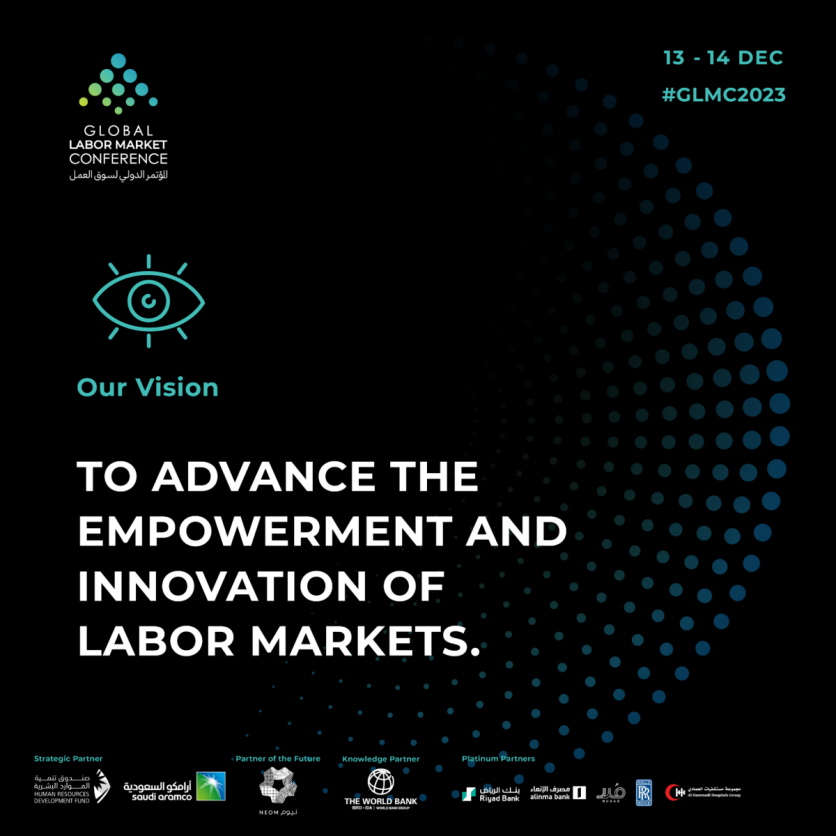
There is a shift happening in the global labor market driven by technology. According to a recent Goldman Sachs report, AI has the potential to replace 300 million full-time jobs across industries. However, that is not all. While alarming, this revolution is not just an omen of job displacement; it's also a prelude to unprecedented economic growth. Experts predict artificial intelligence has the possibility to enhance global productivity by 7%, transforming the very way we work.
The Global Labor Market Conference (GLMC) stands at the heart of uncertainty and opportunity. This groundbreaking event will take place on December 13th and 14th at the King Abdullah International Conference Center (KAICC) in Riyadh, Saudi Arabia. More than a conference, GLMC aims to bring together policymakers, labor leaders, academics, and influential business figures from all over the world to tackle the pressing challenges that are reshaping labor markets globally.
With over 2,000 participants, 120 speakers, and 40 sessions, the GLMC is poised to create a dynamic environment for exchanging ideas and strategies. The conference's agenda is ambitiously broad yet meticulously focused, seeking to dissect and understand the catalysts driving change in today's labor market. This includes delving into the latest evidence and best practices for tackling contemporary labor market challenges, from AI-induced disruptions to demographic shifts and beyond.
Statistics from various sources paint a vivid picture: in the U.S. and Europe, a quarter of tasks could soon be AI-driven, affecting two-thirds of jobs to varying degrees. Surprisingly, it's not just blue-collar roles at risk. Research from the University of Pennsylvania and OpenAI reveals that white-collar workers earning upwards of $80,000 are equally vulnerable to this wave of automation.
The manufacturing sector is not immune either. An MIT and Boston University report foresees AI usurping two million manufacturing jobs by 2025. McKinsey Global Institute's study suggests that by 2030, 14% of the global workforce may need to pivot careers, driven by the relentless march of digitization, robotics, and AI.
The GLMC's roster of speakers, including luminaries like ILO Secretary General Gilbert Houngbo and NEOM CEO Nadhmi Al-Nasr, is set to tackle these issues head-on. The team will also focus on skill-building initiatives to empower workers from diverse generations and backgrounds. To that end, the GLMC is set to evaluate the outcomes of innovative labor market experiments from across the globe. These insights will be crucial in shaping policies and strategies that are both forward-looking and grounded in real-world experiences.
Similarly, workplace culture, often overlooked in the tech discussion, will receive its due spotlight. The GLMC emphasizes creating inclusive, adaptable environments where technology complements human talent, not replaces it. This holistic view extends to debates on regulation and climate change, ensuring a future where tech-driven workplaces are sustainable and humane.
From the panel of speakers to the participants, the Global Labor Market Conference is more than just a gathering of minds; it's a crucible where ideas, fears, and aspirations converge. It's about embracing the future of work with optimism, ensuring that the human element remains at the heart of labor market evolution. As more voices join this critical conversation, the GLMC promises to set a new standard for global collaboration and innovation in the labor market solutions space.
ⓒ 2025 TECHTIMES.com All rights reserved. Do not reproduce without permission.





